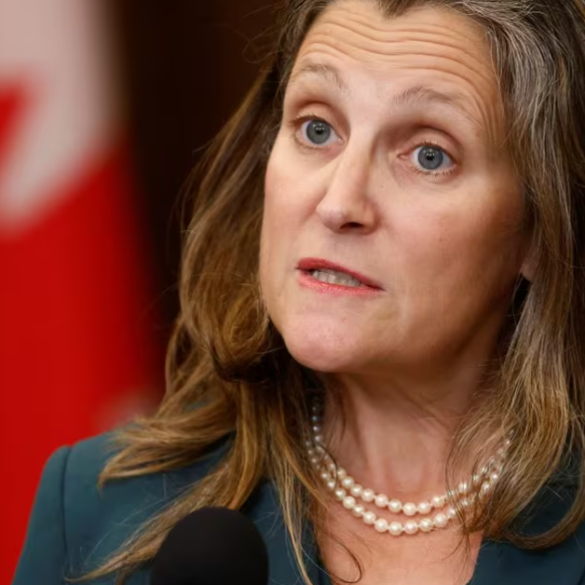
Deputy Prime Minister and Minister of Finance Chrystia Freeland speaks to journalists on Parliament Hill in Ottawa, September 19, 2023. (REUTERS/Blair Gable)

By Andrew Chen
Canadian industry needs to be protected from Chinese “oversupply,” Deputy Prime Minister Chrystia Freeland says, as her government mulls tariffs on Chinese electric vehicles (EVs) similar to the United States.
“We cannot let Canadian industry be wiped out by Chinese oversupply and overcapacity,” Ms. Freeland said during a May 28 press conference updating her government’s economic plan.
Ms. Freeland’s comments followed earlier remarks from Prime Minister Justin Trudeau, who hinted at the possibility of tariffs on China following the U.S. announcement, but did not commit to similar action.
“We are going to watch carefully what the U.S. is doing, and we will make decisions on how to make sure we’re protecting Canadian automakers, Canadian auto workers, and the Canadian economy at the same time,” Mr. Trudeau said shortly after meeting with U.S. Vice-President Kamala Harris on the sidelines of an event held in Philadelphia on May 21.
On May 14, U.S. President Joe Biden announced a tariff hike in on imports of Chinese-made electric vehicles, from 25 percent to 100 percent. The decision was driven by concerns over unfair subsidies to EV manufacturers by the Chinese regime and other “non-market practices” that have resulted in overcapacity, aiming to safeguard the American industry, according to a White House press release. Additionally, the U.S. announced plans to raise tariffs on other Chinese goods, including solar cells, computer chips, and lithium-ion batteries, which are integral components in electric vehicles.
Ms. Freeland also expressed concern about Beijing’s practices, noting that state-directed economic policies are leading to overcapacity and oversupply in sectors like steel, aluminum, critical minerals, and manufacturing, which she characterized as “not playing by the rules.”
Chinese-made EV exports grew by 70 percent from 2022 to 2023, the White House release stated, warning that this growth is “jeopardizing productive investments elsewhere.”
In Canada, EV imports from China also saw a surge recently, coinciding with Tesla’s shift from the United States to Shanghai factories for Canadian sales.
Prior to 2023, Chinese-made EVs comprised only 1.2 percent of total electric vehicle imports to Canada and were valued at $84 million in 2022. However, with Tesla relocating its Canadian-bound production to China, imports jumped to $2.2 billion in 2023. Tesla currently accounts for almost one-third of the Canadian EV market share, placing China second behind only the U.S. in imports, with $2.8 billion.
EV Sales Goal
The federal government recently released a plan aimed at making all new vehicle sales in Canada zero-emission EVs by 2035. The plan involves graduated steps, with one-fifth of vehicles required to be fully electric or plug-in hybrids by 2026, which will go up to three-fifths by 2030.
As part of the plan, the government is also offering a $5,000 incentive for EVs. Under Canada’s model, any electric vehicle that costs less than $55,000 qualifies for the $5,000 incentive. That means purchases of Tesla’s Chinese-made Model 3 and Model Y cars qualify.
Canada and the U.S. have been aligning their EV industries in recent years, including around critical minerals, batteries, and EV manufacturing.
Canada has made substantial investments in the EV industry, allocating $30 billion in the last two years alone for EV battery and vehicle manufacturing facilities for companies like Stellantis, Volkswagen, and Honda. This effort is largely aimed at safeguarding North America’s auto industry from China.